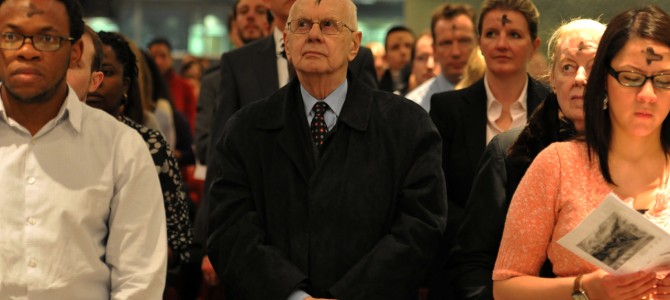
Lent can be a really strange time, both for the Christian and the non-Christian. For the non-Christian, it is a time when there is all kinds of religious “stuff” going on that nobody can really explain. Unless you are Roman Catholic, Lutheran, or Eastern Orthodox, in all likelihood Lent is as much a mystery to you as it is to the non-Christian. It may even be downright wrong. “Lent? Isn’t that some weird thing they did in the Middle Ages?”
Let me try to take some of the mystery out of Lent for the non-believer, and put some mystery back in for the Christian.
Lent (which basically means “spring”) is a time when Christians all over the world prepare for Jesus Christ’s resurrection of the dead. It starts on Ash Wednesday, which is 47 days before Easter. You may recognize hearing the term “40 days of Lent”. This is because the Sundays are not considered a part of Lent.
Historically, there are three practices associated with Lent: Prayer, fasting, and almsgiving or works of mercy. It is a time when Christians mourn over their sin (called repentance) and learn again to trust in their Savior, Jesus Christ. Just like you don’t only go to a doctor once, in the same way a Christian can benefit from a “checkup” on their faith, to remind them who they are as baptized children of God.
In connection with this, Lent can be a time of great focus for the Christian. Our culture is inundated with input. As I sit here writing this on my iPad, I am watching my son do his homework, listening to another child crying, checking Facebook on my phone, all while drinking a Diet Coke at McDonald’s. Sometimes it’s a wonder we can think at all!
But in order to focus more on one thing, one must also learn to focus less on other things. In our secular culture, we can see this with the rise of minimalism in everything from apps on our phone to architectural design to how we lay out our kitchens. Great design leads to simplicity, not complexity. And because our lives are increasingly complex, something has to change in order for us to get out of the continual spin cycle of life. While these ideas are often held up as Buddhist in our day, they really belong to the Christian tradition just as much.
In Christian terms, this is really why we “give up” things for Lent. Roman Catholics have historically done this the most, but other Christian traditions are learning to embrace it as well. By giving up something that is a regular part of your life (e.g. a kind of food or drink, games, or maybe even Facebook), this allows you to focus more on one thing. For the Christian, that one thing is Jesus Christ, who gave up everything for us, even life itself. So Lent can become a time of beautiful simplicity, hearing again the words of the Bible, and coming to God in repentant joy for what He has done for us.
Now some Christian traditions have largely rejected these practices as being too “Roman Catholic” or just plain weird. I can remember growing up in the Midwest and being taught that giving things up for Lent really amounted to works righteousness. For a Lutheran, them’s fightin’ words!
It is possible for practices such as fasting or prayer or acts of charity might lead to works righteousness, or trying to get to heaven by what we do, rather than by what we believe. If I do things these in order to show off how good a Christian I am, then they really are of no benefit to me or anyone else.
This is why in the historic Gospel reading for Ash Wednesday, Jesus starts each section like this:
“…when you give to the needy, sound no trumpet before you, as the hypocrites do in the synagogues and in the streets, that they may be praised by others.” (Matthew 6:2 ESV)
“And when you pray, you must not be like the hypocrites. For they love to stand and pray in the synagogues and at the street corners, that they may be seen by others.” (Matthew 6:5 ESV)
“And when you pray, do not heap up empty phrases as the Gentiles do, for they think that they will be heard for their many words.” (Matthew 6:7 ESV)
In each of these cases, Jesus exhorts us not to do these things as a show. There is no room in the Christian faith for works righteousness. But Jesus does assume that the Christian will be doing these things.
In my experience, the greatest danger today lies in rejecting these ancient practices of prayer, fasting and almsgiving, because I think I know better than thousands of years of Christian and pre-Christian history. American culture is much more inclined to overindulgence and entitlement than we are to works righteousness. At the risk of being labeled a “closet catholic,” I’m going to go out on a limb and say that for most of us, we could use a little less indulgence, and a little more discipline in our lives.
So I would like to issue a challenge to my Christian and non-Christian friends alike this Lent. Try focusing more by doing less. Don’t take the second helping. Drink less. Give your eyes a break from the glowing rectangles. Pray more. Give to those in need. By doing less, you may find that your focus sharpens and you can see more clearly.
For the Christian, that means focusing on the One who gave His life as a ransom for the whole world. That seems like a pretty good focus to me.
Rev. Todd A. Peperkorn, STM, is pastor of Holy Cross Lutheran Church (LCMS) in Rocklin, California. You may find more of his writing at Lutheranlogomaniac.com.









